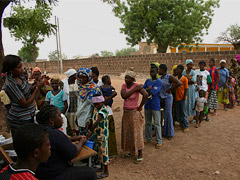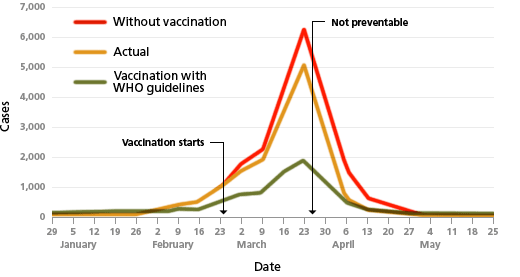Control of epidemics in Africa
Preventive vaccination is better than reactive mass campaigns
Emergency mass vaccination campaigns are difficult to implement quickly and effectively. |
Up to recently the approach for prevention and control of meningococcal epidemics was exclusively based on early detection of the disease and emergency mass vaccination of the at-risk population with bivalent A/C or trivalent A/C/W135 polysaccharide vaccines. These interventions are massive, expensive, and disruptive. Scarce resources are deflected from an already overstretched public health service.
Guidelines have been developed, based on weekly disease incidence rates, to determine whether the disease has reached alert or epidemic levels:
- Alert threshold: 5 cases/100,000.
- Epidemic threshold: 10 or 15 cases/100,000, depending on the situation.
As soon as an epidemic has been identified, an investigation team is sent to the area to confirm the etiology of the disease and, if appropriate, initiate an emergency response. It includes management of cases and mass vaccination of the entire population provided that vaccine supplies and administrative support are available. If resources are limited, it may be necessary to restrict vaccination to the age-groups most at risk.
In theory, it is thought that a rapidly implemented vaccination campaign—one that begins within three to four weeks of an epidemic onset—will prevent about 70 percent of cases.
In practice, however, it is difficult, if not impossible, to launch a reactive campaign so rapidly, as vaccines arrive in limited quantities and often too late to do much good. For instance, a study conducted by Woods et al.1 in 2000 shows that reactive mass campaigns prevented only 23 percent of cases and 18 percent of deaths during the 1996–1997 meningitis epidemic in Ghana.
Despite organizational and logistic improvements in recent years, African public health officials have been frustrated with having to respond to meningococcal epidemics with strategies that are at best, moderately useful and at worst, ineffective.
Emergency vaccination with polysaccharide vaccine. Source: Woods et al. 2000. |
1. Woods CW, Armstrong G, Sackey SO, et al. Emergency vaccination against epidemic meningitis in Ghana: implications for the control of meningococcal disease in West Africa. The Lancet. 2000;355(9197):30–33.
Photo: Monique Berlier.


